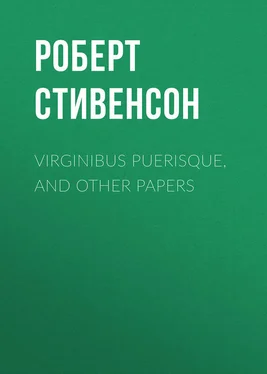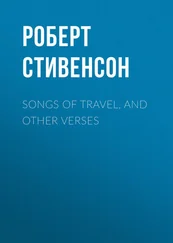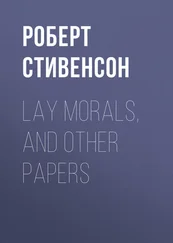Роберт Стивенсон - Virginibus Puerisque, and Other Papers
Здесь есть возможность читать онлайн «Роберт Стивенсон - Virginibus Puerisque, and Other Papers» — ознакомительный отрывок электронной книги совершенно бесплатно, а после прочтения отрывка купить полную версию. В некоторых случаях можно слушать аудио, скачать через торрент в формате fb2 и присутствует краткое содержание. Жанр: literature_19, foreign_antique, foreign_prose, на английском языке. Описание произведения, (предисловие) а так же отзывы посетителей доступны на портале библиотеки ЛибКат.
- Название:Virginibus Puerisque, and Other Papers
- Автор:
- Жанр:
- Год:неизвестен
- ISBN:нет данных
- Рейтинг книги:4 / 5. Голосов: 1
-
Избранное:Добавить в избранное
- Отзывы:
-
Ваша оценка:
- 80
- 1
- 2
- 3
- 4
- 5
Virginibus Puerisque, and Other Papers: краткое содержание, описание и аннотация
Предлагаем к чтению аннотацию, описание, краткое содержание или предисловие (зависит от того, что написал сам автор книги «Virginibus Puerisque, and Other Papers»). Если вы не нашли необходимую информацию о книге — напишите в комментариях, мы постараемся отыскать её.
Virginibus Puerisque, and Other Papers — читать онлайн ознакомительный отрывок
Ниже представлен текст книги, разбитый по страницам. Система сохранения места последней прочитанной страницы, позволяет с удобством читать онлайн бесплатно книгу «Virginibus Puerisque, and Other Papers», без необходимости каждый раз заново искать на чём Вы остановились. Поставьте закладку, и сможете в любой момент перейти на страницу, на которой закончили чтение.
Интервал:
Закладка:
Robert Louis Stevenson
Virginibus Puerisque, and Other Papers
“VIRGINIBUS PUERISQUE”
I
With the single exception of Falstaff, all Shakespeare’s characters are what we call marrying men. Mercutio, as he was own cousin to Benedick and Biron, would have come to the same end in the long run. Even Iago had a wife, and, what is far stranger, he was jealous. People like Jacques and the Fool in Lear , although we can hardly imagine they would ever marry, kept single out of a cynical humour or for a broken heart, and not, as we do nowadays, from a spirit of incredulity and preference for the single state. For that matter, if you turn to George Sand’s French version of As You Like It (and I think I can promise you will like it but little), you will find Jacques marries Celia just as Orlando marries Rosalind.
At least there seems to have been much less hesitation over marriage in Shakespeare’s days; and what hesitation there was was of a laughing sort, and not much more serious, one way or the other, than that of Panurge. In modern comedies the heroes are mostly of Benedick’s way of thinking, but twice as much in earnest, and not one quarter so confident. And I take this diffidence as a proof of how sincere their terror is. They know they are only human after all; they know what gins and pitfalls lie about their feet; and how the shadow of matrimony waits, resolute and awful, at the cross-roads. They would wish to keep their liberty; but if that may not be, why, God’s will be done! “What, are you afraid of marriage?” asks Cécile, in Maître Guerin . “Oh, mon Dieu, non!” replies Arthur; “I should take chloroform.” They look forward to marriage much in the same way as they prepare themselves for death: each seems inevitable; each is a great Perhaps, and a leap into the dark, for which, when a man is in the blue devils, he has specially to harden his heart. That splendid scoundrel, Maxime de Trailles, took the news of marriages much as an old man hears the deaths of his contemporaries. “C’est désespérant,” he cried, throwing himself down in the arm-chair at Madame Schontz’s; “c’est désespérant, nous nous marions tous!” Every marriage was like another gray hair on his head; and the jolly church bells seemed to taunt him with his fifty years and fair round belly.
The fact is, we are much more afraid of life than our ancestors, and cannot find it in our hearts either to marry or not to marry. Marriage is terrifying, but so is a cold and forlorn old age. The friendships of men are vastly agreeable, but they are insecure. You know all the time that one friend will marry and put you to the door; a second accept a situation in China, and become no more to you than a name, a reminiscence, and an occasional crossed letter, very laborious to read; a third will take up with some religious crotchet and treat you to sour looks thence-forward. So, in one way or another, life forces men apart and breaks up the goodly fellowships for ever. The very flexibility and ease which make men’s friendships so agreeable while they endure, make them the easier to destroy and forget. And a man who has a few friends, or one who has a dozen (if there be any one so wealthy on this earth), cannot forget on how precarious a base his happiness reposes; and how by a stroke or two of fate – a death, a few light words, a piece of stamped paper, a woman’s bright eyes – he may be left, in a month, destitute of all. Marriage is certainly a perilous remedy. Instead of on two or three, you stake your happiness on one life only. But still, as the bargain is more explicit and complete on your part, it is more so on the other; and you have not to fear so many contingencies; it is not every wind that can blow you from your anchorage; and so long as Death withholds his sickle, you will always have a friend at home. People who share a cell in the Bastile, or are thrown together on an uninhabited isle, if they do not immediately fall to fisticuffs, will find some possible ground of compromise. They will learn each other’s ways and humours, so as to know where they must go warily, and where they may lean their whole weight. The discretion of the first years becomes the settled habit of the last; and so, with wisdom and patience, two lives may grow indissolubly into one.
But marriage, if comfortable, is not at all heroic. It certainly narrows and damps the spirits of generous men. In marriage, a man becomes slack and selfish, and undergoes a fatty degeneration of his moral being. It is not only when Lydgate misallies himself with Rosamond Vincy, but when Ladislaw marries above him with Dorothea, that this may be exemplified. The air of the fireside withers out all the fine wildings of the husband’s heart. He is so comfortable and happy that he begins to prefer comfort and happiness to everything else on earth, his wife included. Yesterday he would have shared his last shilling; to-day “his first duty is to his family,” and is fulfilled in large measure by laying down vintages and husbanding the health of an invaluable parent. Twenty years ago this man was equally capable of crime or heroism; now he is fit for neither. His soul is asleep, and you may speak without constraint; you will not wake him. It is not for nothing that Don Quixote was a bachelor and Marcus Aurelius married ill. For women, there is less of this danger. Marriage is of so much use to a woman, opens out to her so much more of life, and puts her in the way of so much more freedom and usefulness, that, whether she marry ill or well, she can hardly miss some benefit. It is true, however, that some of the merriest and most genuine of women are old maids; and that those old maids, and wives who are unhappily married, have often most of the true motherly touch. And this would seem to show, even for women, some narrowing influence in comfortable married life. But the rule is none the less certain: if you wish the pick of men and women, take a good bachelor and a good wife.
I am often filled with wonder that so many marriages are passably successful, and so few come to open failure, the more so as I fail to understand the principle on which people regulate their choice. I see women marrying indiscriminately with staring burgesses and ferret-faced, white-eyed boys, and men dwell in contentment with noisy scullions, or taking into their lives acidulous vestals. It is a common answer to say the good people marry because they fall in love; and of course you may use and misuse a word as much as you please, if you have the world along with you. But love is at least a somewhat hyperbolical expression for such luke-warm preference. It is not here, anyway, that Love employs his golden shafts; he cannot be said, with any fitness of language, to reign here and revel. Indeed, if this be love at all, it is plain the poets have been fooling with mankind since the foundation of the world. And you have only to look these happy couples in the face, to see they have never been in love, or in hate, or in any other high passion, all their days. When you see a dish of fruit at dessert, you sometimes set your affections upon one particular peach or nectarine, watch it with some anxiety as it comes round the table, and feel quite a sensible disappointment when it is taken by some one else. I have used the phrase “high passion.” Well, I should say this was about as high a passion as generally leads to marriage. One husband hears after marriage that some poor fellow is dying of his wife’s love. “What a pity!” he exclaims; “you know I could so easily have got another!” And yet that is a very happy union. Or again: A young man was telling me the sweet story of his loves. “I like it well enough as long as her sisters are there,” said this amorous swain; “but I don’t know what to do when we’re alone.” Once more: A married lady was debating the subject with another lady. “You know, dear,” said the first, “after ten years of marriage, if he is nothing else, your husband is always an old friend.” “I have many old friends,” returned the other, “but I prefer them to be nothing more.” “Oh, perhaps I might
Читать дальшеИнтервал:
Закладка:
Похожие книги на «Virginibus Puerisque, and Other Papers»
Представляем Вашему вниманию похожие книги на «Virginibus Puerisque, and Other Papers» списком для выбора. Мы отобрали схожую по названию и смыслу литературу в надежде предоставить читателям больше вариантов отыскать новые, интересные, ещё непрочитанные произведения.
Обсуждение, отзывы о книге «Virginibus Puerisque, and Other Papers» и просто собственные мнения читателей. Оставьте ваши комментарии, напишите, что Вы думаете о произведении, его смысле или главных героях. Укажите что конкретно понравилось, а что нет, и почему Вы так считаете.












